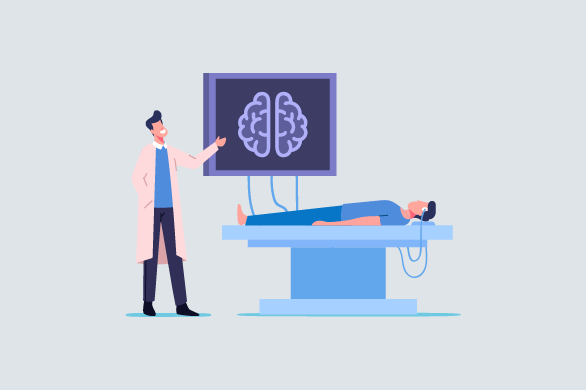
DM - Neurology
- 86 Colleges
Neurology is the study of the nervous systems and the care and treatment of all disorders and diseases.
The nervous system forms one of the most sophisticated and complex systems of the body. The study of the nervous systems and the care and treatment of all disorders and diseases directly affecting or associated with them is what makes the speciality of Neurology. The practitioners of the speciality, neurologists diagnose, treat and manage various problems of the brain, spinal cord, and nerves such as multiple sclerosis, seizure disorders, coordination problems, strokes, muscle weakness, sensation disorders, headache disorders like migraine, infections of the nervous systems like meningitis, neurodegenerative diseases, movement disorders, speech and language disorders and so on. They perform detailed examinations and procedures as part of their diagnoses such as lumbar puncture, tensilon test, EEG, EMG, CT-scan, MRI, PET scan and less conventional methods like sleep studies. As an ever-evolving and complicated field of study, many of the secrets yet to be revealed, several forms of investigations and research are being conducted every year. The most recent advancements are in areas such as the intervertebral disc and spondylosis, HIV in the brain, effects of antithrombotic therapy within forty-eight hours of ischaemic stroke, MRI & telemetry usage in the better diagnosis of seizure, Interferon betas in treatment of multiple sclerosis, stroke management, cure for migraine, therapeutic developments for Parkinson’s disease, precision medicine and so on.
Doctor of Medicine in Neurology is aimed at producing Neurologists both skilled and knowledgeable in the study and care of the nervous system. The course is rigorous as well as fascinating. Inquisitive minds shall find many opportunities in this field. To accomplish such goals, the course is designed to cover the entirety of neurology including recent advances. The syllabus includes Basic General Sciences and Investigative neuro surgery, computer science, statistics, basic neurosciences, neuro anatomy, neurophysiology, neuropathology, neurochemistry, electrocorticography, Tomography of skull and spine, CT Scan, MRI & MRA & MR Spectroscopy, Angiography, myelography, EEG and EMG, nerve conduction study, evoked potential, electrocorticography, brain Mapping, ultrasonography of a brain, transcranial Doppler, clinical neurology, basic neurology, neurological disease, congenital malformation, neuropharmacology, developmental anomaly, elicitation interpretation of neurological symptoms and signs, brain death, clinical neurosurgery, the practices of neurosurgery and recent advances, intracranial pressure monitoring, developmental anomalies - operative surgery, trauma - operative surgery, bacterial infections, parasitic and fungal infections, vascular diseases, spine and spinal cord - disorders - operative Surgery, intracranial tumors- operative surgery, stereotaxy, movement disorders, cerebral palsy and epilepsy, paediatric neurosurgery, intraoperative monitoring and so on. After the completion of the course, the students are expected to have developed a deep understanding of Neurology and all its allied specialities, have at their disposal the knowledge of commonly used diagnostic tools and tests, be able to perform advanced investigation procedures and interpret them, have a thorough understanding of common neuroimaging investigations, be able to perform invasive procedures such as lumbar puncture and be able to initiate and be part of advanced research projects. In addition to these skills, the candidates are expected to be able to organize and conduct teaching programmes, exhibit good communication skills, and be able to practice with a sound understanding of ethical and legal practices within the field.
Candidates who have an M.D. from an institution recognized by the Medical Council of India (MCI) are eligible to apply for the course which is for a duration of three years. As the field is in dire need of competent specialists, successful candidates will have no difficulty finding employment. Several traditional, as well as exciting career options, await them which include clinical specialists, teaching and research. As the study of the brain and mind is ever-evolving, several non-medical opportunities await.
